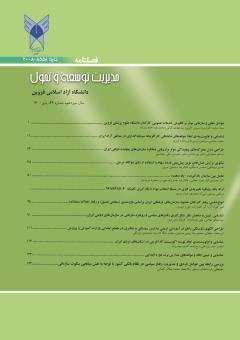الگوی رفتار منصفانه مدیران و تاثیر آن بر گزارشگری مالی
محورهای موضوعی : مدیریتآذر خدابنده 1 , فرزین رضایی 2 * , غلامرضا کردستانی 3 , کیومرث بیگلر 4
1 - دانشجوی دکتری،گروه حسابداری، واحد قزوین، دانشگاه آزاد اسلامی، قزوین، ایران
2 - دانشیار، گروه حسابداری، واحد قزوین، دانشگاه آزاد اسلامی، قزوین، ایران
3 - استاد، گروه حسابداری، دانشگاه بین المللی امام خمینی(ره)، قزوین، ایران
4 - استادیار، گروه حسابداری، واحد قزوین، دانشگاه آزاد اسلامی، قزوین، ایران
کلید واژه: واژههای اصلی: رفتار منصفانه مدیران, گزارشگری مالی, عدالت سازمانی, تصمیمگیری مالی,
چکیده مقاله :
رفتار مدیران در گزارشگری مالی بهعنوان یکی از مؤلفههای حیاتی و بحرانی در عملکرد یک سازمان مطرح میشود.اهمیت این موضوع به دلیل عواقب گستردهای که میتواند بر سازمان و اقتصاد عمومی داشته باشد، غیرقابلانکار است.اصولاً، مدیران در اختیار اطلاعات مالی و عملکرد مالی سازمان هستند و مسئولیت تهیه گزارشهای دقیق و صادق در مورد وضعیت مالی سازمان رادارند. یافتههای پژوهش در 5 مقوله به تفکیک مشخص شدند.مدل در 6 مقوله23کد محوری براساس 148کدباز شناسایی شد. شرایط علی(ویژگیهای فردی، مهارتهای ارتباطی، ویژگیهای ذهنی و ارزشهای اخلاقی)، راهبردها (آموزش، زیرساخت، هدفگذاری گزارش دهی مالی، سیاستگذاری و فناوری اطلاعات)، پیامدها(بهبود تصویر سازمان، شکوفایی کسبوکار و بهرهوری اقتصادی)، شرایط زمینهای(دانش تخصصی، انضباط مالی، قوانین و مقررات، شفافیت اطلاعات، انتقادپذیری و مسئولیتپذیری و وضعیت حسابداری) و شرایط مداخلهگر(ضعف نهادهای نظارتی، فشار مالی، شرایط محیطی، سهلانگاری و غفلت و شرایط فرهنگی و اجتماعی)طراحیشده است. مدل رفتار منصفانه مدیران در جهت افزایش کیفیت گزارشگری مالی در یک سازمان به ترکیبی از اقدامات و سیاستها منجر میشود که نهتنها کیفیت گزارشهای مالی را بهبود میبخشد، بلکه اعتماد اعضای سازمان و سایر ذینفعان به سازمان را نیز تقویت میکند و بافرهنگ سازمانی اخلاقی، افزایش توانمندیهای مدیریتی،توجه به نظارت و ارزیابی مداوم و ترویج شفافیت و مسئولیتپذیری سازمانی همراه است.
The behavior of managers in financial reporting is considered as one of the vital and critical components in the performance of an organization. The importance of this issue is undeniable due to the wide consequences it can have on the organization and the general economy. Basically, managers have access to financial information and financial performance of the organization. and are responsible for preparing accurate and honest reports about the financial status of the organization. The findings of the research were identified separately in 5 categories. The model was identified in 6 categories with 23 core codes based on 148 coders. Causal conditions (personal characteristics, communication skills, mental characteristics and moral values), strategies (training, infrastructure, targeting of financial reporting, policy and information technology), consequences (improving the image of the organization, business prosperity and economic productivity), background conditions (knowledge) Specialization, financial discipline, laws and regulations, transparency of information, accountability and accounting status) and intervening conditions (weakness of regulatory institutions, financial pressure, environmental conditions, negligence and neglect and cultural and social conditions) have been designed. The model of fair behavior of managers in order to increase the quality of financial reporting in an organization leads to a combination of actions and policies that not only improves the quality of financial reports, but also strengthens the trust of organization members and other stakeholders in the organization, and with an ethical organizational culture, increases the capabilities of Management is accompanied by paying attention to continuous monitoring and evaluation and promoting organizational transparency and accountability.

